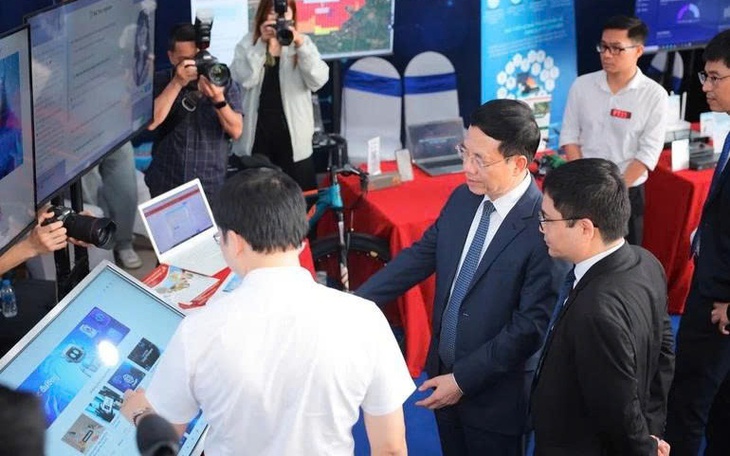
The strategic role of science and innovation
From the early days of nation-building and defence in the revolutionary era, President Ho Chi Minh emphasised: “Science must originate from production and must return to serve production and the people.”
This was not merely a technical orientation but also an affirmation of the role of knowledge and technology in national development and improving people’s lives. His vision of using science to organise and manage society laid the groundwork for today’s modern digital governance thinking. For President Ho Chi Minh, innovation was not a slogan but a national spirit: every Vietnamese person must possess a creative spirit and continuously seek new ideas.
This ideology has been consistently inherited and developed by the Party through successive National Congresses, especially with Resolution No. 20, issued in 2012 on the development of science and technology in service of industrialisation and modernisation; Resolution No. 52, issued in 2019 on proactive participation in the Fourth Industrial Revolution; and most recently, Resolution No. 57, issued in 2024, marking a strategic turning point that defines science, technology, innovation, and digital transformation as pillars of national development.
Resolution No. 57 of the Politburo, with its five guiding principles, five target groups, and seven specific tasks and solutions, affirms that the development of science and technology, innovation, and digital transformation constitutes a “profound and comprehensive revolution across all fields” and is a top-priority breakthrough in national development.
A notable aspect of the resolution is the shift from “science management” to “national innovation governance” — a transformative mindset that emphasises investment in knowledge, technology, and human capital over mere physical infrastructure. Accordingly, enterprises are defined as the main actors of innovation, the state plays a facilitating role, and education and training serve as the foundation.
In addition, the resolution broadens the scope of advanced technology application such as artificial intelligence, big data, and blockchain through sandbox policies, contributing to the formation of an independent and autonomous technology ecosystem. The target is for these three fields to contribute at least 1% to GDP growth by 2030, while aiming for 5% post-2030, thereby laying the groundwork for Viet Nam to become a high-income country by 2045.
To further reinforce the foundation for developing this ecosystem, Resolution No. 68 identifies the private sector as the central driving force, unlocking social potential in safeguarding the ideological foundation through science, technology, and innovation. This marks a pivotal institutional shift, reflecting a strategic transition in development thinking, from a state-led model to a facilitative one, enabling social actors to engage in the knowledge ecosystem.
Resolution 68 not only expands the space for private enterprises in scientific and technological research and application but also highlights their role in urgent tasks related to ideological security, digital sovereignty, technological sovereignty, and cultural resilience. Accordingly, enterprises are no longer mere policy beneficiaries but become co-implementers with the state in key scientific programmes, core technology development, intellectual property, and the national innovation system.
Notably, affirming equal access rights to national-level scientific tasks — which were previously reserved primarily for research institutes, universities, and State-owned enterprises — has opened a new era where private enterprises can leverage their flexibility, creativity, and agility in research, product development, and technology commercialisation. This not only enhances the efficiency of public investment in science and technology but also helps establish new knowledge hubs within the private sector, enriching Viet Nam’s innovation ecosystem.
Gradually materialising the Party’s guidelines
In an era where cyberspace has become a new battlefield, hostile forces are increasingly using modern technology to spread fake news, distort facts, and undermine the Party’s leadership. Sophisticated tactics under the guise of “freedom of speech” and “civil society” are directly affecting the political awareness of certain segments of the population, especially the youth.
In this context, science, technology, and digital transformation can serve as the most powerful ideological weapons — if harnessed appropriately. Proactively building and controlling digital information platforms, training patriotic technology intellectuals, and developing a modern science and technology communication ecosystem are long-term strategic methods to strengthen the “ideological front line.”
Under the leadership of its Party Committee, the Ministry of Science and Technology has actively implemented key tasks to realise Resolution No. 57 and Resolution No. 68 of the Politburo. Becoming more than just a government regulatory body, the ministry is transforming into a “strategic linkage hub” between institutions, markets, enterprises, science, and society.
By perfecting the legal framework, including the draft Law on Science, Technology, and Innovation; the Law on Technology Transfer; the Digital Technology Industry Law; the Law on Product and Goods Quality; the Atomic Energy Law; the Law on Standards, Metrology and Quality; the Intellectual Property Law; and incentive policies for the private sector, the ministry has been removing longstanding barriers in financial mechanisms and administrative procedures that have hindered the growth of science for years.
In the realm of science and technology communication, the ministry has built a nationwide science and technology information network, promoted digital communication, and enhanced the use of AI, open data, and digital platforms to disseminate scientific values, promptly refute false information, and shape public understanding of the Party’s central role in national development based on knowledge.
Programmes such as Techfest, the Viet Nam Innovation Challenge, and initiatives to develop core technologies, science and technology enterprises and innovative startups have helped ignite a spirit of innovation at the grassroots level, spreading the innovation ecosystem to every locality, enterprise, research institute, and community.
The ministry is also working to develop national big data platforms, connect research centres with production sectors, commercialise research outcomes, and link science with the market — an approach that offers an effective ideological defence in the digital competition environment.
In its mission to safeguard the Party’s ideological foundation, the Ministry of Science and Technology, with its central fostering role, is steadily realising the Party’s guidelines through institutions, actions, and an unceasing spirit of innovation.
